my top fifteen women of final fantasy (5-2)
We're down the wire, for this list and FFXV's release itself. My hype is building, and I hope yours is too! If not then, er, hopefully you enjoy this list! As always, comments and discussion about these incredible ladies is more than welcome.
Quick note: At this point the list got very difficult to organize. Technically any of these women could have ranked in any order and I would've felt confident in the list.
#5-Tifa Lockhart
Final Fantasy VII

”Maybe something will happen that can never unhappen, that scares you, doesn't it? But you need to think about it now, really take it in. Look at you, you think you've got it so damn hard. Well you hate being alone so let people in. Sure you might not answer the phone, but I don't see you throw it away either!”
The other half of VII’s incredible heroines, Tifa is a character I think is often misunderstood by casual fans. The skimpy, semi-ridiculousness of her initial costume created a vicious (and completely unfair) opinion of Tifa as a fanservice character with more to her breasts than her personality. I recall once I had a conversation with a very close female friend who was/is only nominally familiar with VII, having watched her brother play it growing up, who recalled Tifa as “that really annoying skanky chick, right?” We’re still friends, despite her completely wrong assumption, but what she said hit me like a ton of bricks. I tried to explain to her that Tifa was so much more than her appearance, but I could tell she was still skeptical…and I couldn’t exactly blame her. Unless you pay attention to what’s going on with Tifa aside from her mini-skirt, it can be distressingly easy to make assumptions based on the way other women in popular gaming at the time (and sometimes even now) were portrayed and designated into roles of sex appeal.
Introduced as a member of AVALANCHE and Cloud’s childhood friend, Tifa’s initial role is to keep the peace between Barret and Cloud. She quickly establishes her romantic interest in Cloud by reminding him of “the promise”, as well as her interest in making a positive change in the world, and by this point the player probably feels they have more than enough evidence to assume everything they need to know about her character. Surely she’s the Love Interest Childhood Friend Outspoken Tomboy Girl, right? But then Aerith enters the story, proves she’s far more outspoken and outgoing, and the proposed love triangle is subverted because these ladies are amazing because the two become very close friends and prioritize their friendship over a competition for Cloud’s feelings.
Just as Aerith quickly proves she’s far more than her overly feminine, pink-coded appearance, Tifa is very much the same. For how revealing her costume choice may be, Tifa is quite a shy person. When I say ‘shy’ I mean it in a more realistic context than the media will usually portray someone who is ‘shy’, to the extent that it might not seem obvious at first. She works in a bar, talks to strangers easily, makes friends quickly, and is considered likable by many around her. The sharp-eyed player will see she’s uncomfortable talking about herself at length and far more interested in hearing other people’s problems than addressing her own. She’s incredibly caring, loving, and willing to place herself in danger for the sake of others, but when it comes to herself she’s overly cautious. She’s gorgeous without being flirtatious (Aerith is far more flirtatious, by far!), and though she’s the most physically able member of the party she secretly indulges in a childhood fantasy where she’s reduced to the role of damsel She contrasts not only Aerith, but also herself.
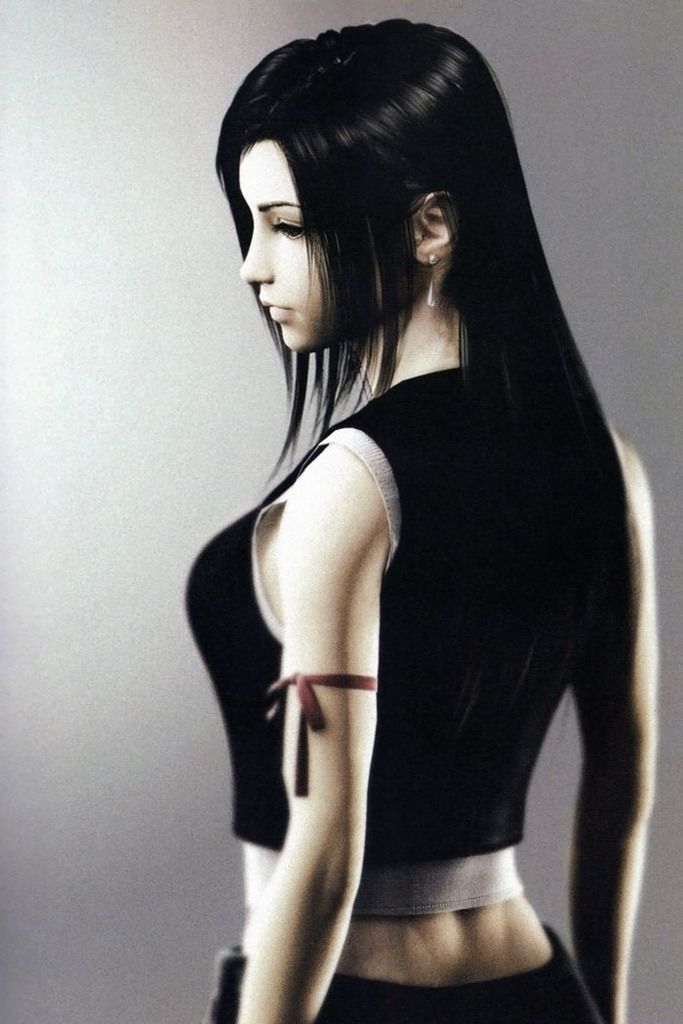
The trauma of her childhood has stayed with her even after the ashes settled over Nibelheim. She copes better than Cloud (understandably so), so it becomes easy for the player (and the party) to label her suffering as “lesser” than his by comparison. Cloud can’t hide his pain from the others because it eventually physically overwhelms him to the point it’s inescapable, and the player experiences it in a very visceral manner. This never happens with Tifa, so she is able to better conceal how much those events shaped her and focus her attention on Cloud’s pain so she doesn’t need to contemplate her own.
Tifa is shaped by her experience just as much as anyone in the party. She effectively becomes an eco-terrorist so she can exact revenge against the people who took everything from her. Unlike the more stoic examples on our list with similar motivations, like Lightning and Ashe, she maintains a relatively cheerful and friendly demeanor. At her core she’s a nice person who cares about others. She is a support friend, not just to love interest Cloud, and one of the party's staunchest allies. Her kindness earns her the party’s trust, to the extent she is appointed team leader once Cloud becomes indisposed, even though there are people who have more experience in positions of leadership. She’s capable, and though her fantasy of being “rescued” by Cloud might cause you to scratch your head, it’s just that- a fantasy. Tifa saves Cloud more than once in the story and can hold her own in most situations. When Cloud finally does rescue her in the final cutscene of the game it’s more a culmination of their relationship than an excuse to damsel her.
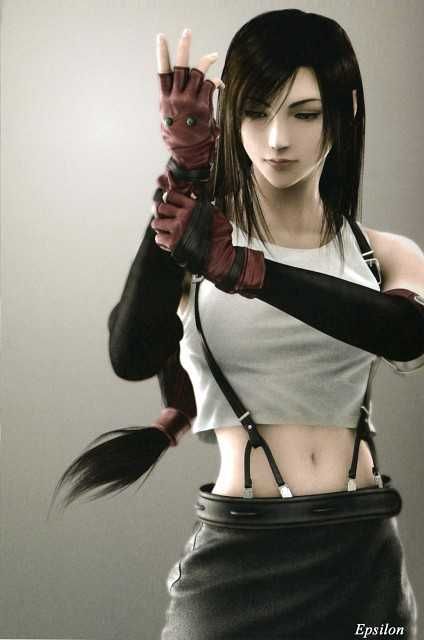
There are a lot of incredible women in this series but Tifa is one of the characters who most feels like someone you could meet in real life. She’s got baggage but she deals with it, she can be strong but also weak, she is capable yet sometimes makes irrational decisions. She is independent but dependent at the same time, confident but also insecure. She is both inconsistent and yet consistent. Originally just a character I liked, the years have seen Tifa climb the ranks of FF’s heroes to the point where I couldn’t decide her placement on this list. She could honestly fit at #3 or #4 for me, she’s just that incredible.
Her primary costume is kinda dumb, yeah (even if I still kinda like it??) but if anyone wants to slut shame Tifa or hate on her without any evidence to back up their claim, you can bet I’ll have a rebuke ready to go.
#4-Oerba Yun Fang
Final Fantasy XIII
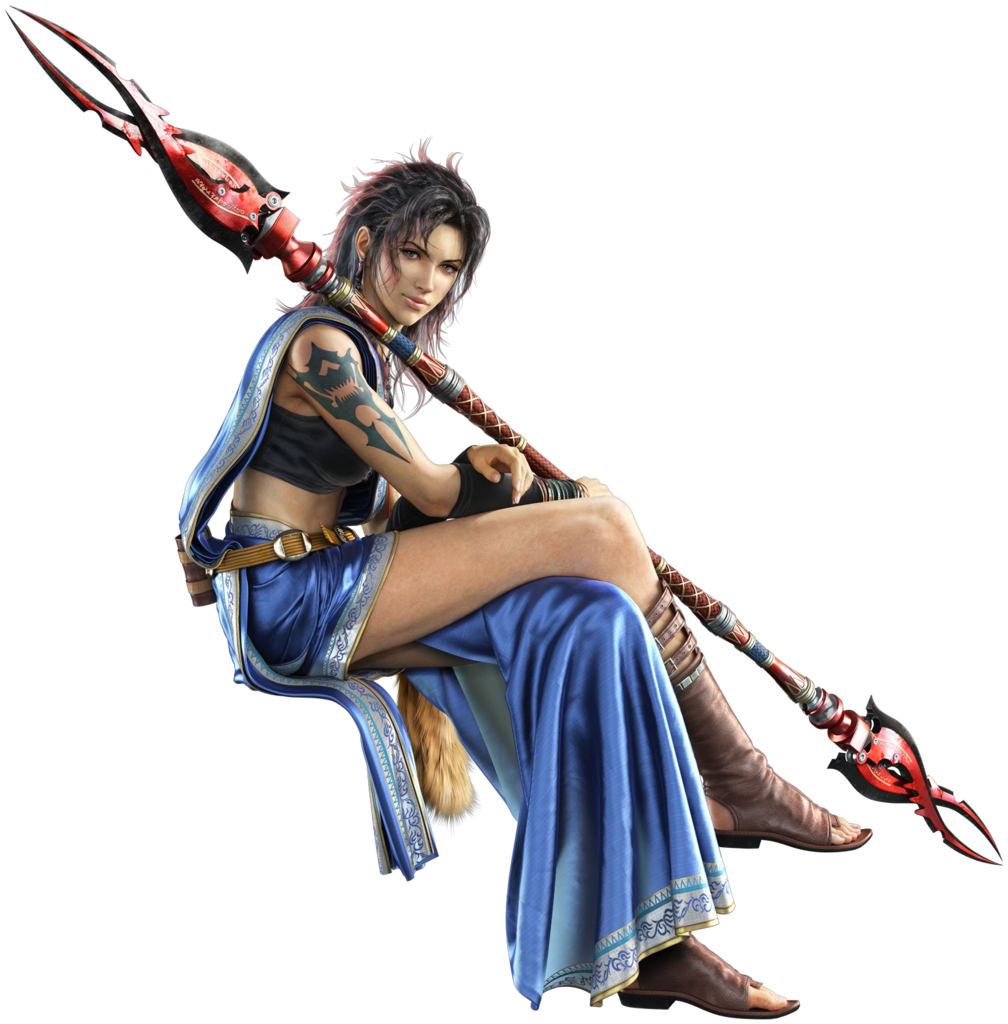
”Guess it's time to "face the peril of our plight." Sounds splendid.”
It’s hard for me to articulately describe my feelings for Fang without sounding completely insane, but I’m going to do my best. Like with Tifa, Fang could’ve fit anywhere in the top five and bounced around a lot when I was agonizing over the order of this list (maybe we can throw up our hands and put all the entries are number 1 in my heart?). She is one of the most physically impressive women in the series, with a unique blend of traits both traditionally masculine and feminine. Her aggressive combat style compliments her usual ability to remain level-headed in high-stake engagements, though at times her protective nature can make her act without thinking. She’s almost like Faris 2.0; more mature and put together, but possibly even more vicious to those who wrong the people she’s closest to.
Fang exudes confidence at almost all times. She’s a badass who knows she’s a badass, but unlike Lightning eschews the stoic loner act. She’s friendly to everyone in the party, easy going and takes most things in stride. She’s protective of the others, but lets them make their own mistakes. She’s cool, one of the coolest characters in the franchise as a whole, the kind of person you’d go out for beers with or be at the top of your list when giving out party invites. She’s the kind of person who’d be willing to get into trouble with you, make it worse, and then stick around for clean-up and bring you aspirin/bandages/bail/candy to keep you straight.
Her relationship with Vanille is her largest motivating factor throughout the series. In XIII she travels with the party to free Vanille from her fate and promises to “tear down the sky” when Vanille is hurt. She does her best to support her through their post awakening, and is willing to do whatever it takes on her behalf. When Vanille is overcome with a martyr complex the size of Cocoon in Lightning Returns, she actively seeks a way to free her from her self-imposed fate. Their relationship, which is very much coded as romantic (information that Fang was originally conceived as a male, with a romantic attachment to Vanille, with only a little change to the character’s core makes it even more obvious), is one of the most interesting and fleshed out of the relationships in the series as a whole.
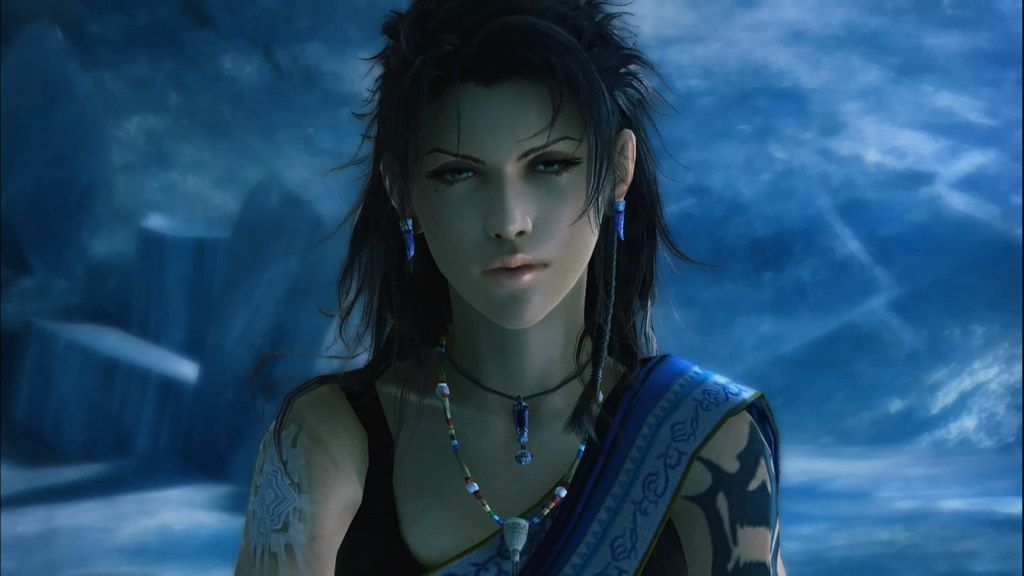
Fang also serves as a foil to Lightning, and stands on more even ground with her than, say, Snow does. Their relationship is quite tumultuous, but it’s clear they become close friends as the story goes on. She’s the only party member who is never afraid of Light, and also the one who will consistently call Light out when necessary. She challenges her, but always supports her. Their relationship is well defined within the original XIII, and given even more presence in Lightning Returns when Fang teams up with Light for an extended length of time. Their interactions are great, and it’s obvious to see why the two are very popular among the shippers.
The burned l’cie tattoo marks Fang as an outsider to the group. She, without understanding how, evaded what was believed to be an inevitable fate, and by doing so she is not bound by the Fal’cie in the same way as her companions. Still, she refuses to allow Vanille to suffer alone, and that care eventually extends out to the entire party. Her protective instincts, plus the skill to back them up, make her as admirable as she is likable.
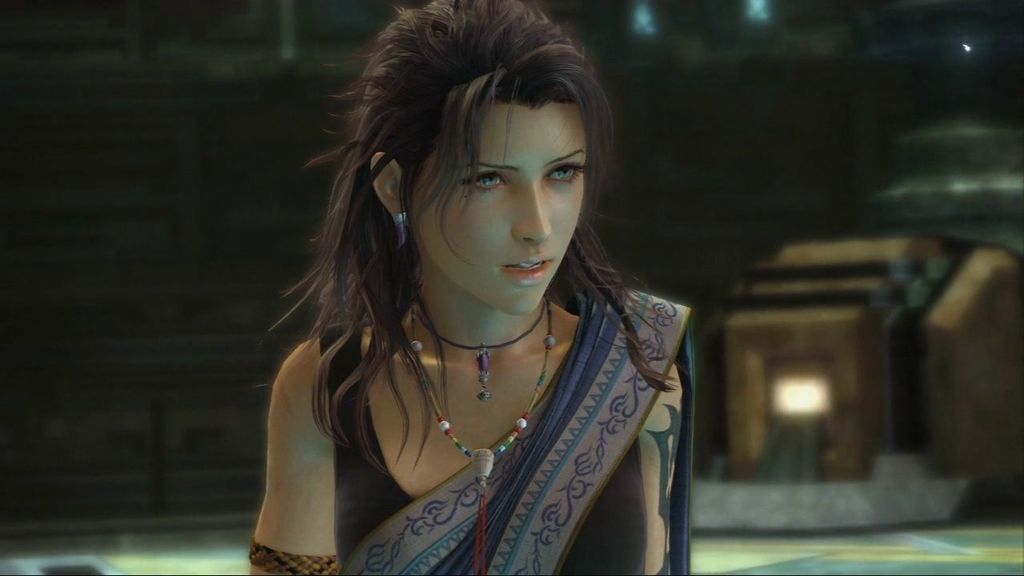
On a superficial note, which I hope my readers won’t take as an invalidation of this celebration of these amazing women, Fang is hot. I’m of the opinion that Fang is easily the most attractive woman in the entire franchise-and this franchise is made up of tons of impossibly beautiful women. From a superficially visual perspective, everything about Fang is damn near perfect: Her body type, the tan complexion of her skin, her piercing cobalt eyes...the wildness of her hair…that breath-stealing smolder…she’s enough to make anyone weak in the knees. Even a self-identified gay man such as myself can look at her and think, “Yeah, no, I’m not that gay.”
Of the entire party in XIII, I think Fang is my favorite to have as party leader. I love that she can split her weapon into two. Like with everything Fang-related it is totally badass.
#3-Terra Branford
Final Fantasy VI
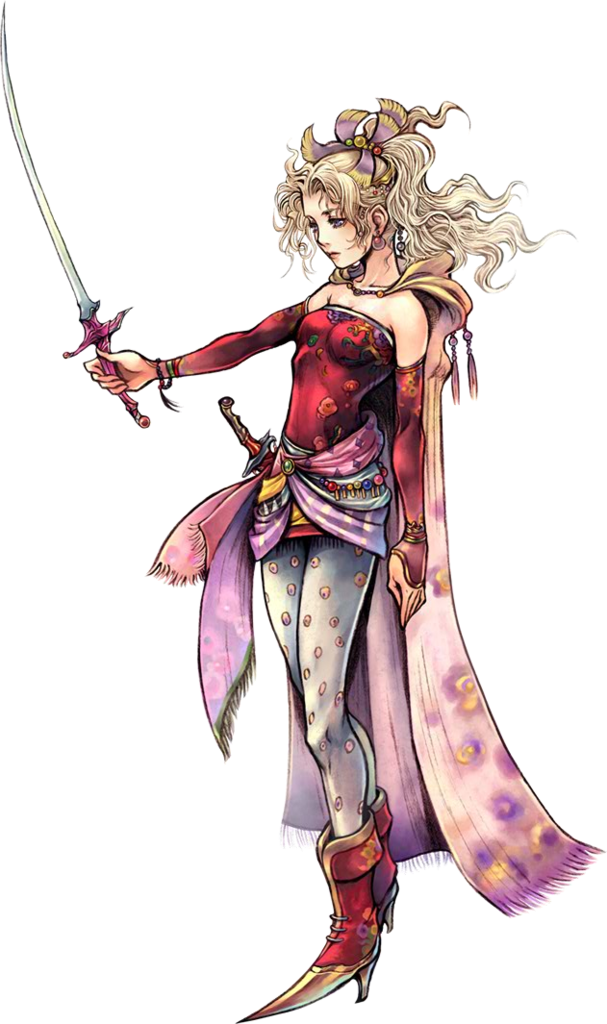
”But... I don't even know what it feels like to love someone.”
As the de facto protagonist of VI, Terra was the first female to assume such status in the franchise. Introduced at the start of the game, Terra takes precedence throughout a majority of the storyline in the World of Balance, has an involved recruitment sidequest in the World of Ruin, and steps into the forefront during the final dungeon (even appearing in a pivotal context during the final scenes of the game if not recruited). Her existence as an esperkin makes her highly sought out by multiple factions throughout the story, and her struggle to understand the duality of her two natures (human and esper) and reconcile them is a major theme throughout the game. She plays with some tropes that are coded “feminine” while completely subverting others in a way that forms a cohesive, compelling character unlike any other in the franchise.
We’re introduced to Terra as an amnesiac- nothing too original for a protagonist of a JRPG- but instead of being just another mysterious waif, she has been accused of being a mass murdering witch. Terra, whose life before her awakening in Narshe is only glimpsed at in very brief flashbacks, worked for the antagonists for the previous eighteen years and can recall very little of it. Her time spent with the empire goes largely unexplored, which leads to an air of mystery about her. The details of her life before the game are only glossed over momentarily, a purposeful decision to really make the player identify with her lack of understanding about her own past. Unlike most characters in fiction who retain their basic personality traits when amnesiac, Terra doesn’t understand herself in the slightest. The control exerted over her using the slave crown, which Kefka uses to force her to roast her fellow soldiers to ‘test’ her power, only muddles the waters further.
Terra’s lack of agency in her past is a major theme which is subtly explored throughout her entire character arc. For a medium that too often disempowers its female characters, it’s amazing to think a SNES game from the mid-90s addressed issues such as the expectation of women’s roles in society and the control of women’s bodies, all without making it obvious it was doing so. Terra is a soldier because she’s been forced into that role, regardless of her personal desires. She is pulled between the different factions at play in a brewing world conflict; to the extent even the heroic Returners make explicit their intent of using her as a weapon. She is less a person to these groups than she is a hydrogen bomb, and I think it was a conscious decision the writers made to make all the leaders on the world stage men, while the object of their desire is a woman. Unlike other figures of her ilk, like Helen of Troy, Terra is not sought after due to her beauty or any other such traditionally “feminine” concept. She is desired for what is often seen as a more “masculine” idea: power.
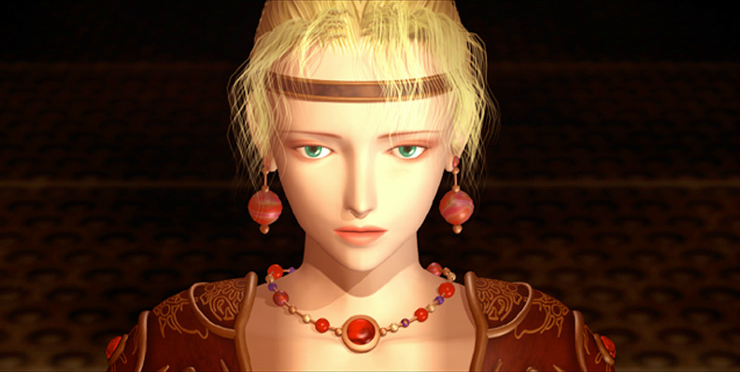
Her soft-spoken, anxious disposition elicits the image of the submissive woman, which would be an accurate assumption of her at the beginning of the game. She is rescued, led around by Locke (and later joined by Edgar) until she meets the Returners, and generally serves as an object for the male characters to fight over. Though she makes her own decisions throughout this time (she agrees to trust Locke, whether or not to assist the Returners, to fight against the empire in Narshe) she doesn’t feel like these decisions are truly hers. Terra’s early storyline examines how it can be for many women in a society which often equates their value in how they are considered by the men around them, though in a more comfortably fantastical setting than our modern world.
When Terra and the rest of the party effectively fight off Kefka’s forces in Narshe, she goes berserk after encountering the Esper and suddenly transforms into a bestial creature which takes off screaming into the night sky. Terra is all about duality, withthe change from human to esper as a physical representation of said theme. After a traumatic near-coma, she comes to terms with herself and makes the decision to embrace both halves of her person, as well as stand against the Empire. Though still possessing depressive qualities to her personality, she makes a concerted effort to make a change-to herself, and to the world around her.
She could have been like Star Trek’s Spock, a character with a similar duality who tries to find a balance between his human and Vulcan halves (usually a representation between emotion and reason), but her character arc focuses more of exploring, and understanding, her emotional side. She wants to understand the concept of “love”, but not necessarily in a romantic context. Unlike the usual trope of an available female character in need of a good love interest, Terra wants to know “love” in any form-romantic, familial, friendship-and laments her fear that she may be incapable of experiencing such an emotion. It isn’t until she meets the orphans left behind in the World of Ruin, and risks losing them to a terrifying demon, that she overcomes her self-imposed limitations and commits to protecting everything she cares about without any hesitation.

In the end, Terra’s growth is a spectacle to behold. The high-strung, mentally overwrought young woman we meet at the beginning of the game is not the same confident, independent woman who lets her hair down on the deck of the Falcon at the end. Her compassion for others, the one constant to her personality, strengthens her resolve and takes her from a compelling sympathetic figure to a compelling heroine. She is, in my eyes, inspiring and relatable all at once.
Oh, yeah, and she’s incredible in battle. Second best mage and one of the best melee fighters, with amazing equip options? Uh, yes please. Though my Terra will always have green hair. Ya’ll better recognize.
#2-Rinoa Heartilly
Final Fantasy VIII
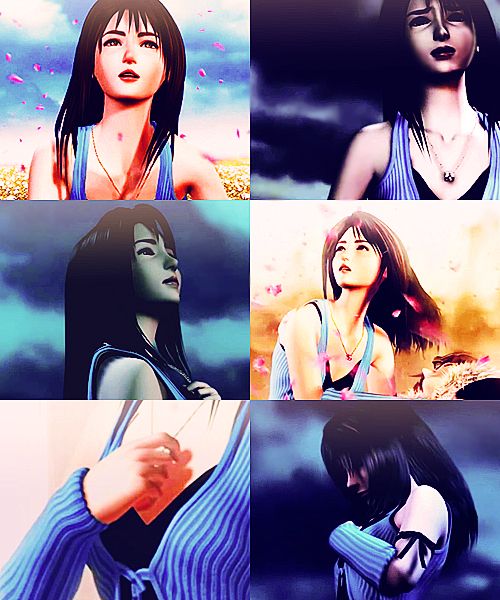
”I guess...I'm getting scared. Sometimes...when I'm with all of you... I...feel like we're on the same wavelength......you know? But when the battles start happening, it's different. Everyone's tempo seems to pick up and... ...I get left behind. I try to catch up, but it's no use... How far is everyone going? I can't hear anyone... Once I catch up, I wonder... Is everyone safe? Will they welcome me with open arms? Is everyone ok? Will we all make it back together?”
Ohhhh boy, so here we are. I expected two things when I first started drafting this list: First, I expected some raised eyebrows at Yuna’s placement when compared with her peers. Second, I expected surprise/disgust/confusion at the fact Rinoa made the list at all, especially when she placed so high. Here’s where I have to remind my thoughtful readers that this is my personal list, and if you decided to make a list of your own which excluded the VIII heroine then I would gladly read it and accept your reasons why she didn’t chart. That being said, allow me to delve a bit into Rinoa and what it was that appealed to me in the first place.
As the secondary protagonist of VIII, Rinoa is a central figure in a number of conflicts throughout the story. Her initial appearance is at the SeeD ball where she first meets Squall and convinces him to dance with her in one of the series’ most iconic scenes. She reappears shortly after as the leader of the Forest Owls, a resistance group who seeks liberation for the city of Timber, and the SeeD’s client. Her plan to interrogate President Deling of Galbadia by committing a train car caper isn’t the most well-conceived plan, but there’s no denying her energy. After Seifer, her ‘summer boyfriend’, compromises SeeD’s involvement on live television and is spirited away by Sorceress Edea, Rinoa is forced to flee Timber with the SeeD agents. Though still technically their client, her contract is temporarily overridden by an official decree from the Headmaster of Trabia Garden who appropriates the SeeD for a dangerous political mission to assassinate the sorceress. Rinoa accompanies the team to Deling City where they meet her father, General Caraway.
This newfound knowledge, plus her insistence that she wants to assist in the mission despite being severely untrained, leads to Quistis laying a scathing-yet justified-verbal lashing on her. The ramifications of the incident lead to a complete breakdown of the original assassination plan, in part because Rinoa decides she’s going to prove everyone wrong and demonstrate her worth to the SeeD (and her father). Her childish behavior leads to Edea casting a fascination spell over her before offering her to Inguion statues brought to life with her magic. Rinoa is saved from certain death at the last minute by Squall and Irvine, but the shock of the experience sits with her for a long time afterwards. In the immediate aftermath she grips Squall’s hand and repeats how terrified she was, unable to find the strength to stand.
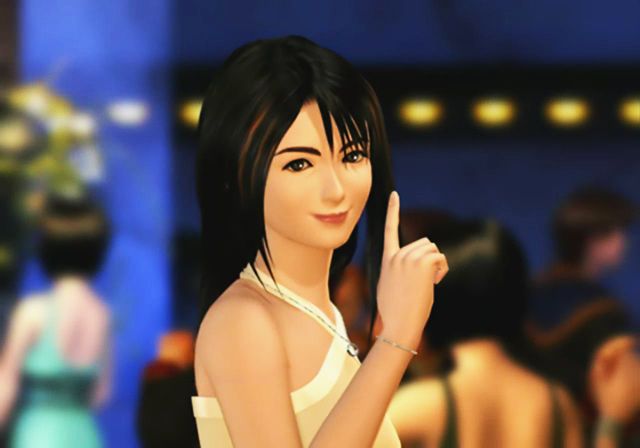
From the start there’s plenty to like about Rinoa: she’s beautiful, charming, energetic, friendly, clever, intelligent, and prone to unconventional thinking. She can speak her mind, freely discuss matters of the heart, and is passionate about her beliefs. She is naturally inquisitive, and she spends a lot of her free time in the library. All of these traits initially appealed to me, but if that was all to her character then, I have to admit, she wouldn’t have made it nearly so high on this list. It was those traits juxtaposed with her deep flaws that made her so memorable: She is compassionate, but more often than not blinded by her privilege. She is naïve, and it’s rarely portrayed in the stereotypical “cute” way. In a world where seventeen year old girls can recruit mercenaries to abduct one of the most politically powerful people on the planet, naivety becomes a dangerous trait to have. She is stubborn, short-sighted, immature, impatient, and, at times, judgmental. Her biggest fear is being left alone, excluded by the people she cares about.
In so many ways, I think Rinoa feels like a real seventeen year old, with all the complex emotions that come with the age. She is relatable. That relatability might be why so many people, especially older people, tend to dislike-or outright hate-her. Maybe they see themselves, or someone they’ve known, in her. Maybe they’re reminded of the tumultuousness that goes with growing up. Rinoa, as a character, really speaks to me. As the game goes on and Rinoa begins to acknowledge her flaws, and mature as a person, I felt a personal resonance with her. Accepting that sometimes you’re not as nice as you think you are, that you’re capable of being short-sighted or needlessly mean, that you need to balance personal strength and how much you rely on others…it’s not easy, and it’s an acceptance that doesn’t truly ever “end”.
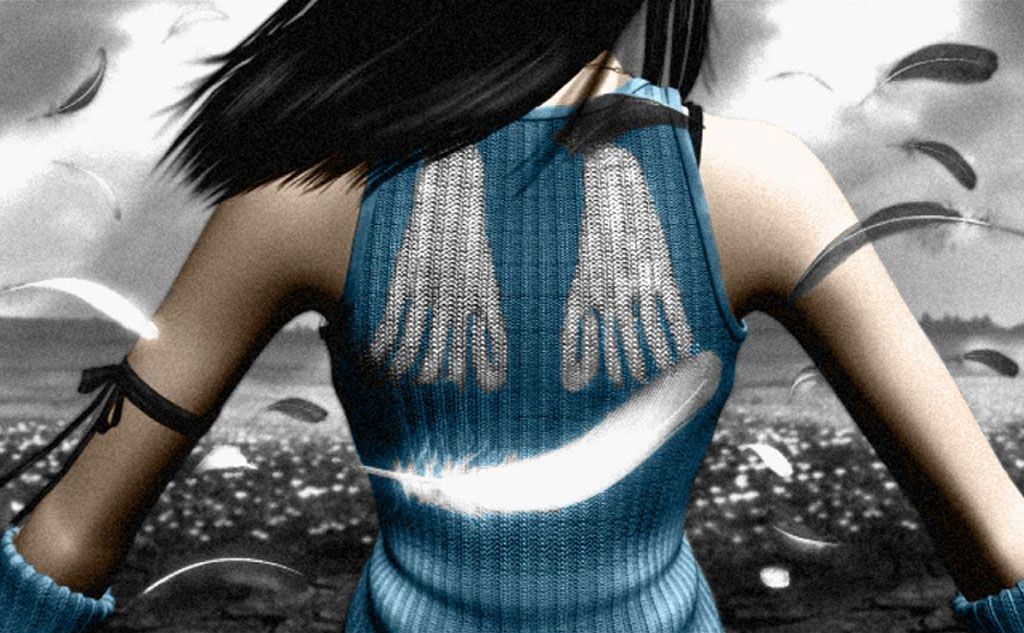
Eventually Rinoa’s inner-most fear of being “different” is brutally realized. Not only is she the only person in the party unaffiliated with Garden, and the one person who didn’t come from Edea’s Orphanage of Plot Convenience, but she becomes a sorceress after she inadvertently receives Edea’s powers. From there onwards it almost feels like the universe is out to crush her: She falls into a coma, becomes possessed by Ultimecia, is left to suffocate-alone- in space, is arrested by the Esthar government immediately and almost cryogenically frozen in the interest of ‘world safety’; becomes the lynchpin of an insane plan which involves willingly letting herself be possessed by Ultimecia again so that she can accompany the SeeD on a crusade across time and space to murder the sorceress and hopefully not cease to exist when it’s all said and done, all the while facing the fact the entire world could come to hate and fear her for the rest of her life.
I would argue that VIII’s narrative is just as much about Rinoa’s evolution into adulthood as it is Squall’s. Some of her development is only shown if she’s brought with Squall during certain segments of the game (when Selphie leads the party to the Missile Base, for example), and I think a number of people missed out on important moments for her character because she wasn’t in the right place at the right time. It might be shoddy game design, but it doesn’t change the fact that Rinoa’s growth mirrors Squall’s in many ways. Where he opens up and becomes a lighter, more emotionally healthy person, Rinoa learns to be more cautious, more serious, and, overall, a more mature individual.
Now that I’ve made my point, I can comfortably ask. What the hell is up with Rinoa’s weapon? It’s like a boomerang-crossbow, I guess, and works on a similar principal? I guess???
Quick note: At this point the list got very difficult to organize. Technically any of these women could have ranked in any order and I would've felt confident in the list.
#5-Tifa Lockhart
Final Fantasy VII

”Maybe something will happen that can never unhappen, that scares you, doesn't it? But you need to think about it now, really take it in. Look at you, you think you've got it so damn hard. Well you hate being alone so let people in. Sure you might not answer the phone, but I don't see you throw it away either!”
The other half of VII’s incredible heroines, Tifa is a character I think is often misunderstood by casual fans. The skimpy, semi-ridiculousness of her initial costume created a vicious (and completely unfair) opinion of Tifa as a fanservice character with more to her breasts than her personality. I recall once I had a conversation with a very close female friend who was/is only nominally familiar with VII, having watched her brother play it growing up, who recalled Tifa as “that really annoying skanky chick, right?” We’re still friends, despite her completely wrong assumption, but what she said hit me like a ton of bricks. I tried to explain to her that Tifa was so much more than her appearance, but I could tell she was still skeptical…and I couldn’t exactly blame her. Unless you pay attention to what’s going on with Tifa aside from her mini-skirt, it can be distressingly easy to make assumptions based on the way other women in popular gaming at the time (and sometimes even now) were portrayed and designated into roles of sex appeal.
Introduced as a member of AVALANCHE and Cloud’s childhood friend, Tifa’s initial role is to keep the peace between Barret and Cloud. She quickly establishes her romantic interest in Cloud by reminding him of “the promise”, as well as her interest in making a positive change in the world, and by this point the player probably feels they have more than enough evidence to assume everything they need to know about her character. Surely she’s the Love Interest Childhood Friend Outspoken Tomboy Girl, right? But then Aerith enters the story, proves she’s far more outspoken and outgoing, and the proposed love triangle is subverted because these ladies are amazing because the two become very close friends and prioritize their friendship over a competition for Cloud’s feelings.
Just as Aerith quickly proves she’s far more than her overly feminine, pink-coded appearance, Tifa is very much the same. For how revealing her costume choice may be, Tifa is quite a shy person. When I say ‘shy’ I mean it in a more realistic context than the media will usually portray someone who is ‘shy’, to the extent that it might not seem obvious at first. She works in a bar, talks to strangers easily, makes friends quickly, and is considered likable by many around her. The sharp-eyed player will see she’s uncomfortable talking about herself at length and far more interested in hearing other people’s problems than addressing her own. She’s incredibly caring, loving, and willing to place herself in danger for the sake of others, but when it comes to herself she’s overly cautious. She’s gorgeous without being flirtatious (Aerith is far more flirtatious, by far!), and though she’s the most physically able member of the party she secretly indulges in a childhood fantasy where she’s reduced to the role of damsel She contrasts not only Aerith, but also herself.

The trauma of her childhood has stayed with her even after the ashes settled over Nibelheim. She copes better than Cloud (understandably so), so it becomes easy for the player (and the party) to label her suffering as “lesser” than his by comparison. Cloud can’t hide his pain from the others because it eventually physically overwhelms him to the point it’s inescapable, and the player experiences it in a very visceral manner. This never happens with Tifa, so she is able to better conceal how much those events shaped her and focus her attention on Cloud’s pain so she doesn’t need to contemplate her own.
Tifa is shaped by her experience just as much as anyone in the party. She effectively becomes an eco-terrorist so she can exact revenge against the people who took everything from her. Unlike the more stoic examples on our list with similar motivations, like Lightning and Ashe, she maintains a relatively cheerful and friendly demeanor. At her core she’s a nice person who cares about others. She is a support friend, not just to love interest Cloud, and one of the party's staunchest allies. Her kindness earns her the party’s trust, to the extent she is appointed team leader once Cloud becomes indisposed, even though there are people who have more experience in positions of leadership. She’s capable, and though her fantasy of being “rescued” by Cloud might cause you to scratch your head, it’s just that- a fantasy. Tifa saves Cloud more than once in the story and can hold her own in most situations. When Cloud finally does rescue her in the final cutscene of the game it’s more a culmination of their relationship than an excuse to damsel her.

There are a lot of incredible women in this series but Tifa is one of the characters who most feels like someone you could meet in real life. She’s got baggage but she deals with it, she can be strong but also weak, she is capable yet sometimes makes irrational decisions. She is independent but dependent at the same time, confident but also insecure. She is both inconsistent and yet consistent. Originally just a character I liked, the years have seen Tifa climb the ranks of FF’s heroes to the point where I couldn’t decide her placement on this list. She could honestly fit at #3 or #4 for me, she’s just that incredible.
Her primary costume is kinda dumb, yeah (even if I still kinda like it??) but if anyone wants to slut shame Tifa or hate on her without any evidence to back up their claim, you can bet I’ll have a rebuke ready to go.
#4-Oerba Yun Fang
Final Fantasy XIII

”Guess it's time to "face the peril of our plight." Sounds splendid.”
It’s hard for me to articulately describe my feelings for Fang without sounding completely insane, but I’m going to do my best. Like with Tifa, Fang could’ve fit anywhere in the top five and bounced around a lot when I was agonizing over the order of this list (maybe we can throw up our hands and put all the entries are number 1 in my heart?). She is one of the most physically impressive women in the series, with a unique blend of traits both traditionally masculine and feminine. Her aggressive combat style compliments her usual ability to remain level-headed in high-stake engagements, though at times her protective nature can make her act without thinking. She’s almost like Faris 2.0; more mature and put together, but possibly even more vicious to those who wrong the people she’s closest to.
Fang exudes confidence at almost all times. She’s a badass who knows she’s a badass, but unlike Lightning eschews the stoic loner act. She’s friendly to everyone in the party, easy going and takes most things in stride. She’s protective of the others, but lets them make their own mistakes. She’s cool, one of the coolest characters in the franchise as a whole, the kind of person you’d go out for beers with or be at the top of your list when giving out party invites. She’s the kind of person who’d be willing to get into trouble with you, make it worse, and then stick around for clean-up and bring you aspirin/bandages/bail/candy to keep you straight.
Her relationship with Vanille is her largest motivating factor throughout the series. In XIII she travels with the party to free Vanille from her fate and promises to “tear down the sky” when Vanille is hurt. She does her best to support her through their post awakening, and is willing to do whatever it takes on her behalf. When Vanille is overcome with a martyr complex the size of Cocoon in Lightning Returns, she actively seeks a way to free her from her self-imposed fate. Their relationship, which is very much coded as romantic (information that Fang was originally conceived as a male, with a romantic attachment to Vanille, with only a little change to the character’s core makes it even more obvious), is one of the most interesting and fleshed out of the relationships in the series as a whole.

Fang also serves as a foil to Lightning, and stands on more even ground with her than, say, Snow does. Their relationship is quite tumultuous, but it’s clear they become close friends as the story goes on. She’s the only party member who is never afraid of Light, and also the one who will consistently call Light out when necessary. She challenges her, but always supports her. Their relationship is well defined within the original XIII, and given even more presence in Lightning Returns when Fang teams up with Light for an extended length of time. Their interactions are great, and it’s obvious to see why the two are very popular among the shippers.
The burned l’cie tattoo marks Fang as an outsider to the group. She, without understanding how, evaded what was believed to be an inevitable fate, and by doing so she is not bound by the Fal’cie in the same way as her companions. Still, she refuses to allow Vanille to suffer alone, and that care eventually extends out to the entire party. Her protective instincts, plus the skill to back them up, make her as admirable as she is likable.

On a superficial note, which I hope my readers won’t take as an invalidation of this celebration of these amazing women, Fang is hot. I’m of the opinion that Fang is easily the most attractive woman in the entire franchise-and this franchise is made up of tons of impossibly beautiful women. From a superficially visual perspective, everything about Fang is damn near perfect: Her body type, the tan complexion of her skin, her piercing cobalt eyes...the wildness of her hair…that breath-stealing smolder…she’s enough to make anyone weak in the knees. Even a self-identified gay man such as myself can look at her and think, “Yeah, no, I’m not that gay.”
Of the entire party in XIII, I think Fang is my favorite to have as party leader. I love that she can split her weapon into two. Like with everything Fang-related it is totally badass.
#3-Terra Branford
Final Fantasy VI

”But... I don't even know what it feels like to love someone.”
As the de facto protagonist of VI, Terra was the first female to assume such status in the franchise. Introduced at the start of the game, Terra takes precedence throughout a majority of the storyline in the World of Balance, has an involved recruitment sidequest in the World of Ruin, and steps into the forefront during the final dungeon (even appearing in a pivotal context during the final scenes of the game if not recruited). Her existence as an esperkin makes her highly sought out by multiple factions throughout the story, and her struggle to understand the duality of her two natures (human and esper) and reconcile them is a major theme throughout the game. She plays with some tropes that are coded “feminine” while completely subverting others in a way that forms a cohesive, compelling character unlike any other in the franchise.
We’re introduced to Terra as an amnesiac- nothing too original for a protagonist of a JRPG- but instead of being just another mysterious waif, she has been accused of being a mass murdering witch. Terra, whose life before her awakening in Narshe is only glimpsed at in very brief flashbacks, worked for the antagonists for the previous eighteen years and can recall very little of it. Her time spent with the empire goes largely unexplored, which leads to an air of mystery about her. The details of her life before the game are only glossed over momentarily, a purposeful decision to really make the player identify with her lack of understanding about her own past. Unlike most characters in fiction who retain their basic personality traits when amnesiac, Terra doesn’t understand herself in the slightest. The control exerted over her using the slave crown, which Kefka uses to force her to roast her fellow soldiers to ‘test’ her power, only muddles the waters further.
Terra’s lack of agency in her past is a major theme which is subtly explored throughout her entire character arc. For a medium that too often disempowers its female characters, it’s amazing to think a SNES game from the mid-90s addressed issues such as the expectation of women’s roles in society and the control of women’s bodies, all without making it obvious it was doing so. Terra is a soldier because she’s been forced into that role, regardless of her personal desires. She is pulled between the different factions at play in a brewing world conflict; to the extent even the heroic Returners make explicit their intent of using her as a weapon. She is less a person to these groups than she is a hydrogen bomb, and I think it was a conscious decision the writers made to make all the leaders on the world stage men, while the object of their desire is a woman. Unlike other figures of her ilk, like Helen of Troy, Terra is not sought after due to her beauty or any other such traditionally “feminine” concept. She is desired for what is often seen as a more “masculine” idea: power.

Her soft-spoken, anxious disposition elicits the image of the submissive woman, which would be an accurate assumption of her at the beginning of the game. She is rescued, led around by Locke (and later joined by Edgar) until she meets the Returners, and generally serves as an object for the male characters to fight over. Though she makes her own decisions throughout this time (she agrees to trust Locke, whether or not to assist the Returners, to fight against the empire in Narshe) she doesn’t feel like these decisions are truly hers. Terra’s early storyline examines how it can be for many women in a society which often equates their value in how they are considered by the men around them, though in a more comfortably fantastical setting than our modern world.
When Terra and the rest of the party effectively fight off Kefka’s forces in Narshe, she goes berserk after encountering the Esper and suddenly transforms into a bestial creature which takes off screaming into the night sky. Terra is all about duality, withthe change from human to esper as a physical representation of said theme. After a traumatic near-coma, she comes to terms with herself and makes the decision to embrace both halves of her person, as well as stand against the Empire. Though still possessing depressive qualities to her personality, she makes a concerted effort to make a change-to herself, and to the world around her.
She could have been like Star Trek’s Spock, a character with a similar duality who tries to find a balance between his human and Vulcan halves (usually a representation between emotion and reason), but her character arc focuses more of exploring, and understanding, her emotional side. She wants to understand the concept of “love”, but not necessarily in a romantic context. Unlike the usual trope of an available female character in need of a good love interest, Terra wants to know “love” in any form-romantic, familial, friendship-and laments her fear that she may be incapable of experiencing such an emotion. It isn’t until she meets the orphans left behind in the World of Ruin, and risks losing them to a terrifying demon, that she overcomes her self-imposed limitations and commits to protecting everything she cares about without any hesitation.

In the end, Terra’s growth is a spectacle to behold. The high-strung, mentally overwrought young woman we meet at the beginning of the game is not the same confident, independent woman who lets her hair down on the deck of the Falcon at the end. Her compassion for others, the one constant to her personality, strengthens her resolve and takes her from a compelling sympathetic figure to a compelling heroine. She is, in my eyes, inspiring and relatable all at once.
Oh, yeah, and she’s incredible in battle. Second best mage and one of the best melee fighters, with amazing equip options? Uh, yes please. Though my Terra will always have green hair. Ya’ll better recognize.
#2-Rinoa Heartilly
Final Fantasy VIII

”I guess...I'm getting scared. Sometimes...when I'm with all of you... I...feel like we're on the same wavelength......you know? But when the battles start happening, it's different. Everyone's tempo seems to pick up and... ...I get left behind. I try to catch up, but it's no use... How far is everyone going? I can't hear anyone... Once I catch up, I wonder... Is everyone safe? Will they welcome me with open arms? Is everyone ok? Will we all make it back together?”
Ohhhh boy, so here we are. I expected two things when I first started drafting this list: First, I expected some raised eyebrows at Yuna’s placement when compared with her peers. Second, I expected surprise/disgust/confusion at the fact Rinoa made the list at all, especially when she placed so high. Here’s where I have to remind my thoughtful readers that this is my personal list, and if you decided to make a list of your own which excluded the VIII heroine then I would gladly read it and accept your reasons why she didn’t chart. That being said, allow me to delve a bit into Rinoa and what it was that appealed to me in the first place.
As the secondary protagonist of VIII, Rinoa is a central figure in a number of conflicts throughout the story. Her initial appearance is at the SeeD ball where she first meets Squall and convinces him to dance with her in one of the series’ most iconic scenes. She reappears shortly after as the leader of the Forest Owls, a resistance group who seeks liberation for the city of Timber, and the SeeD’s client. Her plan to interrogate President Deling of Galbadia by committing a train car caper isn’t the most well-conceived plan, but there’s no denying her energy. After Seifer, her ‘summer boyfriend’, compromises SeeD’s involvement on live television and is spirited away by Sorceress Edea, Rinoa is forced to flee Timber with the SeeD agents. Though still technically their client, her contract is temporarily overridden by an official decree from the Headmaster of Trabia Garden who appropriates the SeeD for a dangerous political mission to assassinate the sorceress. Rinoa accompanies the team to Deling City where they meet her father, General Caraway.
This newfound knowledge, plus her insistence that she wants to assist in the mission despite being severely untrained, leads to Quistis laying a scathing-yet justified-verbal lashing on her. The ramifications of the incident lead to a complete breakdown of the original assassination plan, in part because Rinoa decides she’s going to prove everyone wrong and demonstrate her worth to the SeeD (and her father). Her childish behavior leads to Edea casting a fascination spell over her before offering her to Inguion statues brought to life with her magic. Rinoa is saved from certain death at the last minute by Squall and Irvine, but the shock of the experience sits with her for a long time afterwards. In the immediate aftermath she grips Squall’s hand and repeats how terrified she was, unable to find the strength to stand.

From the start there’s plenty to like about Rinoa: she’s beautiful, charming, energetic, friendly, clever, intelligent, and prone to unconventional thinking. She can speak her mind, freely discuss matters of the heart, and is passionate about her beliefs. She is naturally inquisitive, and she spends a lot of her free time in the library. All of these traits initially appealed to me, but if that was all to her character then, I have to admit, she wouldn’t have made it nearly so high on this list. It was those traits juxtaposed with her deep flaws that made her so memorable: She is compassionate, but more often than not blinded by her privilege. She is naïve, and it’s rarely portrayed in the stereotypical “cute” way. In a world where seventeen year old girls can recruit mercenaries to abduct one of the most politically powerful people on the planet, naivety becomes a dangerous trait to have. She is stubborn, short-sighted, immature, impatient, and, at times, judgmental. Her biggest fear is being left alone, excluded by the people she cares about.
In so many ways, I think Rinoa feels like a real seventeen year old, with all the complex emotions that come with the age. She is relatable. That relatability might be why so many people, especially older people, tend to dislike-or outright hate-her. Maybe they see themselves, or someone they’ve known, in her. Maybe they’re reminded of the tumultuousness that goes with growing up. Rinoa, as a character, really speaks to me. As the game goes on and Rinoa begins to acknowledge her flaws, and mature as a person, I felt a personal resonance with her. Accepting that sometimes you’re not as nice as you think you are, that you’re capable of being short-sighted or needlessly mean, that you need to balance personal strength and how much you rely on others…it’s not easy, and it’s an acceptance that doesn’t truly ever “end”.

Eventually Rinoa’s inner-most fear of being “different” is brutally realized. Not only is she the only person in the party unaffiliated with Garden, and the one person who didn’t come from Edea’s Orphanage of Plot Convenience, but she becomes a sorceress after she inadvertently receives Edea’s powers. From there onwards it almost feels like the universe is out to crush her: She falls into a coma, becomes possessed by Ultimecia, is left to suffocate-alone- in space, is arrested by the Esthar government immediately and almost cryogenically frozen in the interest of ‘world safety’; becomes the lynchpin of an insane plan which involves willingly letting herself be possessed by Ultimecia again so that she can accompany the SeeD on a crusade across time and space to murder the sorceress and hopefully not cease to exist when it’s all said and done, all the while facing the fact the entire world could come to hate and fear her for the rest of her life.
I would argue that VIII’s narrative is just as much about Rinoa’s evolution into adulthood as it is Squall’s. Some of her development is only shown if she’s brought with Squall during certain segments of the game (when Selphie leads the party to the Missile Base, for example), and I think a number of people missed out on important moments for her character because she wasn’t in the right place at the right time. It might be shoddy game design, but it doesn’t change the fact that Rinoa’s growth mirrors Squall’s in many ways. Where he opens up and becomes a lighter, more emotionally healthy person, Rinoa learns to be more cautious, more serious, and, overall, a more mature individual.
Now that I’ve made my point, I can comfortably ask. What the hell is up with Rinoa’s weapon? It’s like a boomerang-crossbow, I guess, and works on a similar principal? I guess???